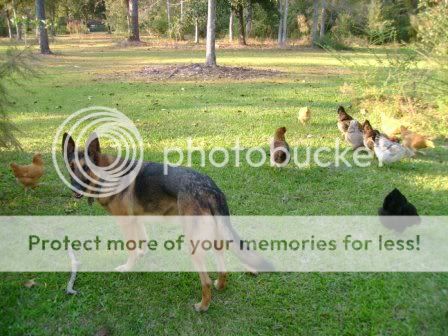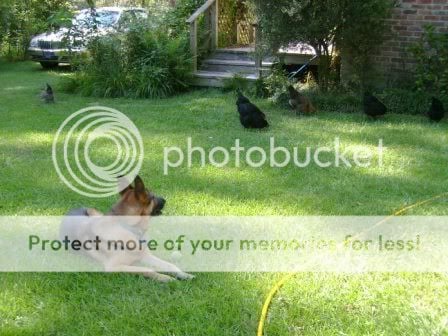I guess I got spoiled in a way. With my first GSD I got very lucky. The people imported nice dogs from Germany and bred them. They wanted only males and she was a female, so I got her quite cheaply.
Her temperament was fabulous. When she grew up, I was interested in having a puppy from her, and eventually I contacted a professional handler/trainer/breeder who had imported his top foundation dog from a kennel he trained with in Germany. He paid about $10,000 for that puppy many years back.
After working my dog a while to check her temperament, he agreed to a breeding, which cost me 1/3 of the litter (incredibly steep fee if you count the cost those 4 puppies eventually sold for, LOL). But I got my little man from that litter, my top pick. And he was the most wonderful dog ever.
I agree with the point that American dogs are so over-angulated. Cosmetics have cost the breed much of what it was designed to do. I visited a couple of dog shows and was shocked to see nervous dogs snapping at people, ears taped to stand, and dogs so low-slung in the back they didn't move properly (in my eyes). Maybe I went to a poor quality show, or there was a particularly poor breeder there, but I was shocked.
Guess I wish I'd kept that line alive. I had a lot of people asking to breed to my male as he aged, but I didn't realize how special he really was, and I didn't want a puppy at that time as I was planning to start my own family soon.
I AM shocked at what people charge for dogs these days. True, you can easily get a very poor-quality animal bred with NO attention to temperament or health and be charged hundreds of dollars. And the idea of selling "designer dogs" which are essentially mutts for well upwards of $1,000 or $2,000 ... well, LOL. Not that mutts can't be good dogs too, but I never imagined people paying so much for one.
I'd call the guy who owned the sire of my dog, but I am pretty sure I can't afford his prices either, not to mention driving across the country.
Sorry, but it seems a silly situation to me. I made the commitment to first of all raise my daughter. I do work, and many hours, but I do it so that I can still be with her enough, so my income is a lot less than it might be if I took a different kind of job. But because of that, it seems impossible to afford a dog. Like I said, that just seems silly to me.
I feel like I'm getting too far off topic though, and I don't want to do that. Mostly I just wanted to say that I agreed with Ruth and Flufnstuff that GSDs can be absolutely fabulous guardians. Highly trainable, and gorgeous besides. My only concern would be that my young male had a pretty strong herd instinct as a pup, and he would have had to be taught not to herd chickens/ducks all day and worry the animals, but it wouldn't have been a problem for me. As long as you give them *some* job to do, they are ok. I used to work mine several times each day in obedience (I love training dogs!) and that along with play and exercise kept mine very satisfied.
I've always heard good things about Great Pyrenees and Anatolian Shepherds too, but have zero personal experience with them. Overall I think herding/guard dogs are an excellent choice, as long as their energy level isn't at the "bouncing off the walls" level of some of the smaller ones. Even then, if you are able to spend enough time with them, it might work well. I think the larger shepherd breeds in general are the best bet though. Just in my opinion, of course.
trish





